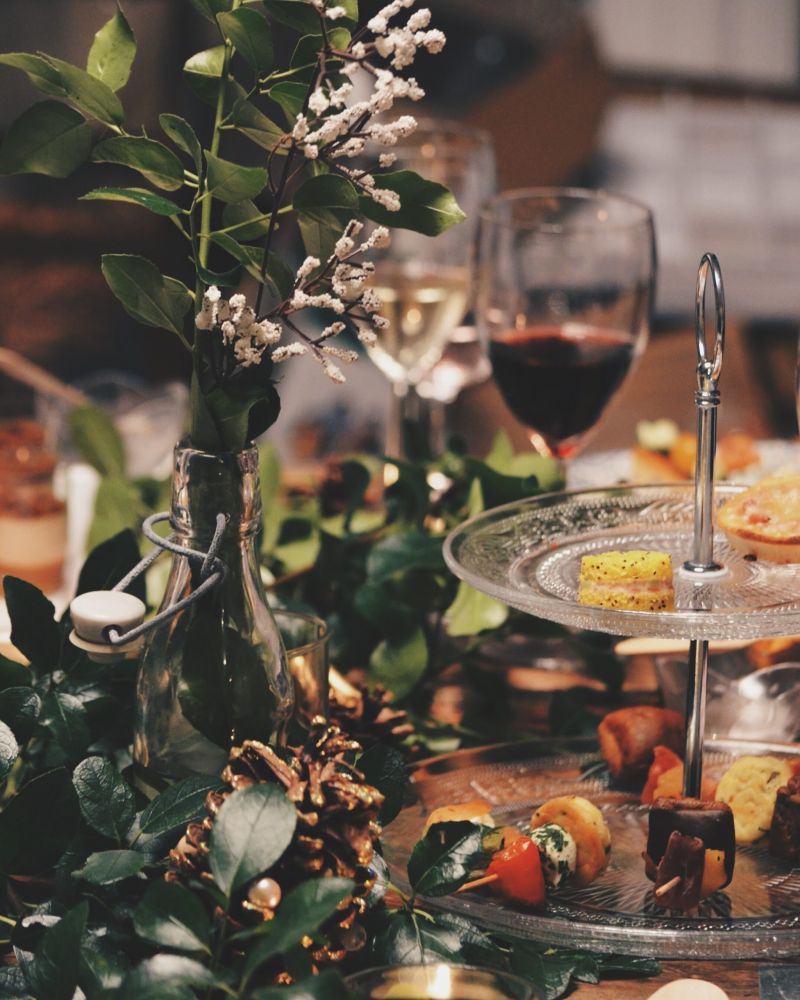Conviviality and tradition momentarily more important than price and sustainability

December is the time of the year that people associate with cold and dark, but also cosiness, lights, warmth and the holiday season. We wanted to find out more about the role of food during the holidays, and what people pay attention to when deciding what to eat for their festive meal. So we asked our Food Forum community. A total of 49 participants gave us an insight into what the holidays look like for them.
Everyone has a different way of spending the days together. One participant names decorating the house, being fully in the festive mood and being together around the Christmas tree. Some participants name gift-giving, making a sumptuous meal, or just sitting on the sofa with a Christmas movie.
“I celebrate with friends and family. Cosying up around the Christmas tree and the fireplace, giving each other gifts, and then having a nice dinner together.” Eva
Companionship and meal sharing
For many participants, eating a meal together is an important moment and something that comes with it every year. Where some opt for an elaborate feast with the whole family, others are more likely to choose a smaller gathering, as long as it is with the people they care about.
“I often celebrate the December holidays with family. Not too big, but just small and cosy. We do like traditions, so we think something like a buffet or gourmets really do belong to Christmas.” Bob
Not everyone wants to spend as much time and effort on the meal,. Therefore, the choice is then made to share this burden with the whole party, in order to still have a fully set table.
“We usually do an “American style” dinner, so everyone makes a contribution and that saves a lot of work and we do have a nice meal together which everyone likes.” Tiny
Eating out is also an option for many, especially on Boxing Day. This means not having to think up a menu, spend time in the kitchen or clean up after the meal.
Even if there is actually no time for it, participants still choose to make the most of it, with the Christmas thought in their heads.
“I almost always have to work (work in a hotel) and so does my flatmate (read: my sister). We try to just enjoy the possible few free hours we have with each other: doing fun games, munching on some goodies.” Bianca
Supermarkets are an important source of inspiration for the holidays
Most participants actively look for meal ideas around and during the holidays, and supermarkets are a source of inspiration for finding festive recipes for many of them.
“I already have an idea about the full menu and have put together the menu based on super tasty products and info I discovered in supermarket advertising.” Sandy.
In the Netherlands, all major supermarkets are giving attention to plant-based dishes for Christmas this year. Albert Heijn, for instance, has a fully vegan magazine with recipes on its website, and supermarkets like Jumbo, Lidl and Aldi also have a vegetarian category with recipes. However, recipes centred on fish or meat are still the most promoted, on both websites and magazines. And this is reflected in the choices participants make for their festive meals.
What should not be missed at Christmas?
For most, the main course is meat. One of the frequently mentioned must-haves is gourmetting, where you prepare your food with everyone at the same time and choose what you like.
“I think gourmet is really something that suits Christmas and then finish with a nice bowl of ice cream. Not difficult, but cosy.” Nicolette.
There are only a few participants who will consciously not eat meat this holiday season.
“Trying new dishes, preferably with different vegetables and without meat.” Mark
Other must-haves that should not be missed according to participants are mainly sweet dishes, such as desserts. Examples mentioned include: biscuits, chocolate tiramisu, stewed pears, ice cream cake and plum pudding.
Most participants choose to cook and eat their familiar, traditional dishes during the holidays, or a combination of traditional and new.
A chance for chefs to showcase their skills
For a smaller group of people, the Christmas holidays are the time of year to go all out. Among cooks, there are participants who like to stick to their traditions, but also those who like to experiment.
“We think it would be fun to cook a three-course dinner for us together. We love trying new things and extensive cooking.” Romy
What do they pay attention to when planning a meal?
Even though community members have previously told us that they have adjusted their weekly shopping to the price hike, when it comes to meals during the holidays, the price was not mentioned once. Apparently, conviviality may cost something.
Participants did say they take into account what their guests like and can eat. Over the years, the number of vegetarians and vegans has increased, as has the number of people avoiding gluten or lactose, which makes cooking a little more challenging.
“An extra challenge this year, as we now have a gluten-free and lactose-free family member in addition to vegetarians.” Ellen
Sustainability momentarily less important
Judging from their description of the festive meal, participants did not explicitly consider sustainability. There was no explicit mention of reducing or avoiding eating meat during the holidays. A single participant said not to prepare too much food to avoid throwing it away (or eating the same thing for 3 days). So the climate impact of the festive meal does not seem to be a concern for participants during these specific days.
For most participants, the holidays are a time to get together with family and friends, eat together and, above all, not stress about sustainability, finances, or messing up a very complicated or new dish.
We believe that understanding consumers is key to making the food system more sustainable. Successful innovation and impactful communication require a solid foundation of consumer insight.
We are the insights partner of choice for food companies and non-profits that aim to have a positive impact on society and our planet. Together we empower consumers to make food choices that are good for them as well as for the planet.
The Hague Tech - Wilhelmina van Pruisenweg 35 - 2595AN - The Hague
(+31) (0)70 2042314 - Info@futureoffood.institute
Contact
Fill in this form and we'll be in touch shortly!
Newsletter
Do you want to receive a monthly dose of insights, opinions and events? Please subscribe to our newsletter.









